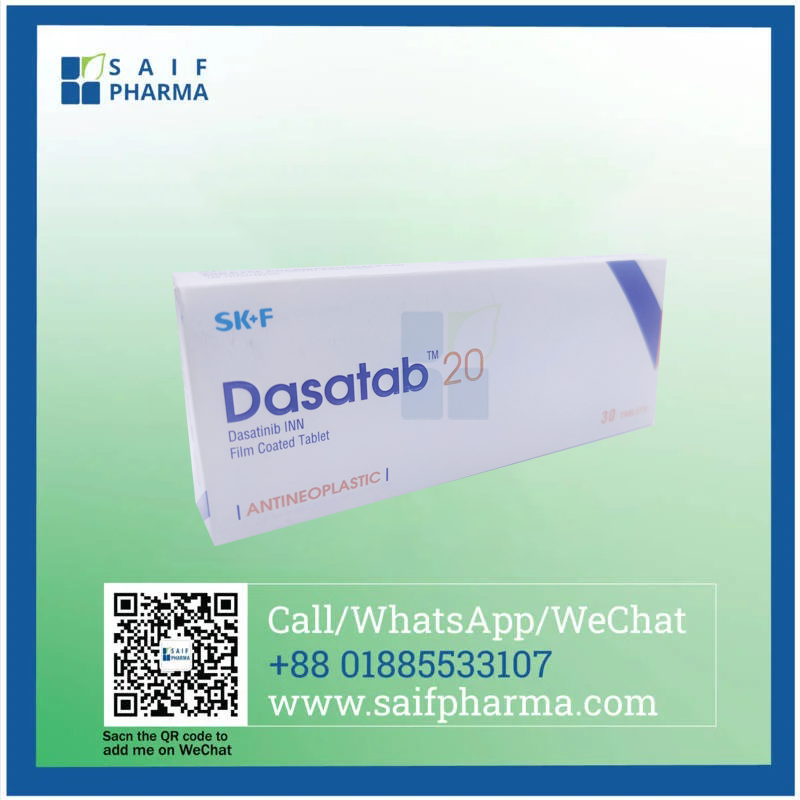Dasatab 20 mg (Dasatinib): Advanced Treatment for Ph+ Leukemia
Overview
Dasatab 20 mg contains Dasatinib, a powerful tyrosine kinase inhibitor specifically designed to target cancer cells in Philadelphia chromosome-positive (Ph+) leukemia. This prescription medicsation offers hope to patients with chronic myeloid leukemia (CML) and acute lymphoblastic leukemia (ALL), including those who have developed resistance to first-line treatments like Imatinib. Manufactured by Eskayef Pharmaceuticals Ltd. and distributed by Saif Pharma, Dasatab represents a significant advancement in cancer therapy with its ability to inhibit multiple cancer-promoting kinases at nanomolar concentrations.
Therapeutic Applications
Dasatab is primarily indicated for several specific leukemia conditions:
For Adult Patients:
- First-line treatment for newly diagnosed Ph+ CML in chronic phase
- Treatment of chronic, accelerated, or blast phase (myeloid or lymphoid) Ph+ CML in patients with resistance or intolerance to prior therapy including Imatinib
- Management of Ph+ ALL in patients with resistance or intolerance to prior therapy
For Pediatric Patients:
- Treatment of Ph+ CML in chronic phase for children 1 year and older
- First-line treatment of newly diagnosed Ph+ ALL when used in combination with chemotherapy
Mechanism of Action
Dasatinib functions as a multi-targeted kinase inhibitor, working at the molecular level to disrupt cancer cell growth and proliferation. At nanomolar concentrations, it effectively inhibits BCR-ABL kinase (the protein produced by the Philadelphia chromosome), as well as SRC family kinases (SRC, LCK, YES, FYN), c-KIT, EPHA2, and PDGFRβ.
What makes Dasatinib particularly valuable is its ability to bind to multiple conformations of the ABL kinase, allowing it to overcome many forms of resistance that develop against first-generation tyrosine kinase inhibitors like Imatinib. This includes resistance caused by BCR-ABL kinase domain mutations, activation of alternate signaling pathways, and multi-drug resistance gene overexpression.
Pharmacokinetic Profile
Dasatab demonstrates favorable pharmacokinetic properties, making it suitable for once-daily dosing:
- Absorption: Reaches maximum plasma concentration between 0.5-6 hours after oral administration
- Distribution: Has an apparent volume of distribution of 2505 L (CV% 93%) with approximately 96% protein binding
- Metabolism: Primarily metabolized by the CYP3A4 enzyme system, with minor contributions from FMO-3 and UGT enzymes
- Elimination: Features a terminal half-life of 3-5 hours with primarily fecal excretion (85% of dose)
Dosage Guidelines
Dasatab is available as a 20 mg tablet formulation that should be taken orally and swallowed whole—not crushed, cut, or chewed. It can be taken with or without food, at any time of day, providing flexibility for patients.
Adult Dosing:
- Chronic Phase CML: 100 mg once daily
- Accelerated Phase or Blast Phase CML/Ph+ ALL: 140 mg once daily
Pediatric Dosing (based on body weight):
- 10 to <20 kg: 40 mg daily
- 20 to <30 kg: 60 mg daily
- 30 to <45 kg: 70 mg daily
- ≥45 kg: 100 mg daily
Pediatric dosing should be recalculated every three months to account for growth and weight changes.
Clinical Considerations
While Dasatab offers significant therapeutic benefits, healthcare providers should be aware of several important clinical considerations:
Drug Interactions
Dasatab’s effectiveness and safety can be affected by concurrent medications:
- CYP3A4 Inhibitors: Strong inhibitors (such as ketoconazole, itraconazole) may increase Dasatab concentrations, potentially enhancing toxicity. Dose reduction should be considered when coadministration is unavoidable.
- CYP3A4 Inducers: Strong inducers (such as rifampin, phenytoin) may decrease Dasatab concentrations, potentially reducing efficacy. Dose increases may be necessary when coadministration cannot be avoided.
- Gastric Acid Reducers: H2 antagonists and proton pump inhibitors should be avoided. If acid-reducing therapy is required, antacids should be used at least 2 hours before or after Dasatab administration.
Safety Profile
Dasatab requires careful patient monitoring for several potential adverse effects:
- Myelosuppression: Regular complete blood counts (CBCs) are essential to monitor for thrombocytopenia, neutropenia, and anemia, which are generally reversible and can be managed through dose adjustments.
- Bleeding Risk: Severe hemorrhage can occur, particularly in patients taking anticoagulants or antiplatelet medications.
- Fluid Retention: Patients should be monitored for signs of fluid retention, which may require diuretics or steroids.
- Cardiovascular Effects: Cardiac dysfunction and QT prolongation are possible, requiring appropriate monitoring.
- Pulmonary Arterial Hypertension: This rare but serious condition may develop during treatment and requires vigilance for symptoms like dyspnea, fatigue, and hypoxia.
- Dermatologic Reactions: Severe skin reactions including Stevens-Johnson syndrome have been reported.
- Tumor Lysis Syndrome: More common in advanced disease; requires preventive measures like hydration and monitoring of electrolytes and uric acid levels.
Special Population Considerations
Dasatab requires special consideration in certain patient populations:
- Pregnancy and Lactation: Dasatinib can cause fetal harm. Women of reproductive potential should use effective contraception during treatment and for 30 days after the final dose. Breastfeeding is not recommended during treatment and for 2 weeks after the last dose.
- Pediatric Use: While effective in children, bone growth and development should be closely monitored.
- Hepatic Impairment: Caution is advised in patients with liver dysfunction, as Dasatinib is primarily metabolized in the liver.
Storage and Handling
Dasatab should be stored below 30°C in a dry place, protected from light, and kept out of reach of children to maintain its stability and ensure safety.
Quality Assurance
Manufactured by Eskayef Pharmaceuticals Ltd., a leading pharmaceutical company with over three decades of experience in producing high-quality medications, Dasatab meets rigorous quality standards. Eskayef’s commitment to excellence ensures that each tablet delivers the intended therapeutic effect consistently.
Global Availability
Supplied by Saif Pharma, an established oncology medicine platform serving over 60 countries, Dasatab is available to patients worldwide. Saif Pharma’s commitment to providing affordable, high-quality oncology medicines aligns with the global effort to increase access to essential cancer treatments.
Conclusion
Dasatab 20 mg (Dasatinib) represents an important advancement in the treatment of Philadelphia chromosome-positive leukemias. Its ability to overcome resistance to first-line therapies offers hope to patients who have limited treatment options. When prescribed and monitored appropriately, Dasatab can significantly improve outcomes for patients with Ph+ CML and ALL, potentially extending survival and enhancing quality of life.
For more information about Dasatab and other oncology medicines, visit www.saifpharma.com or contact your healthcare provider.







